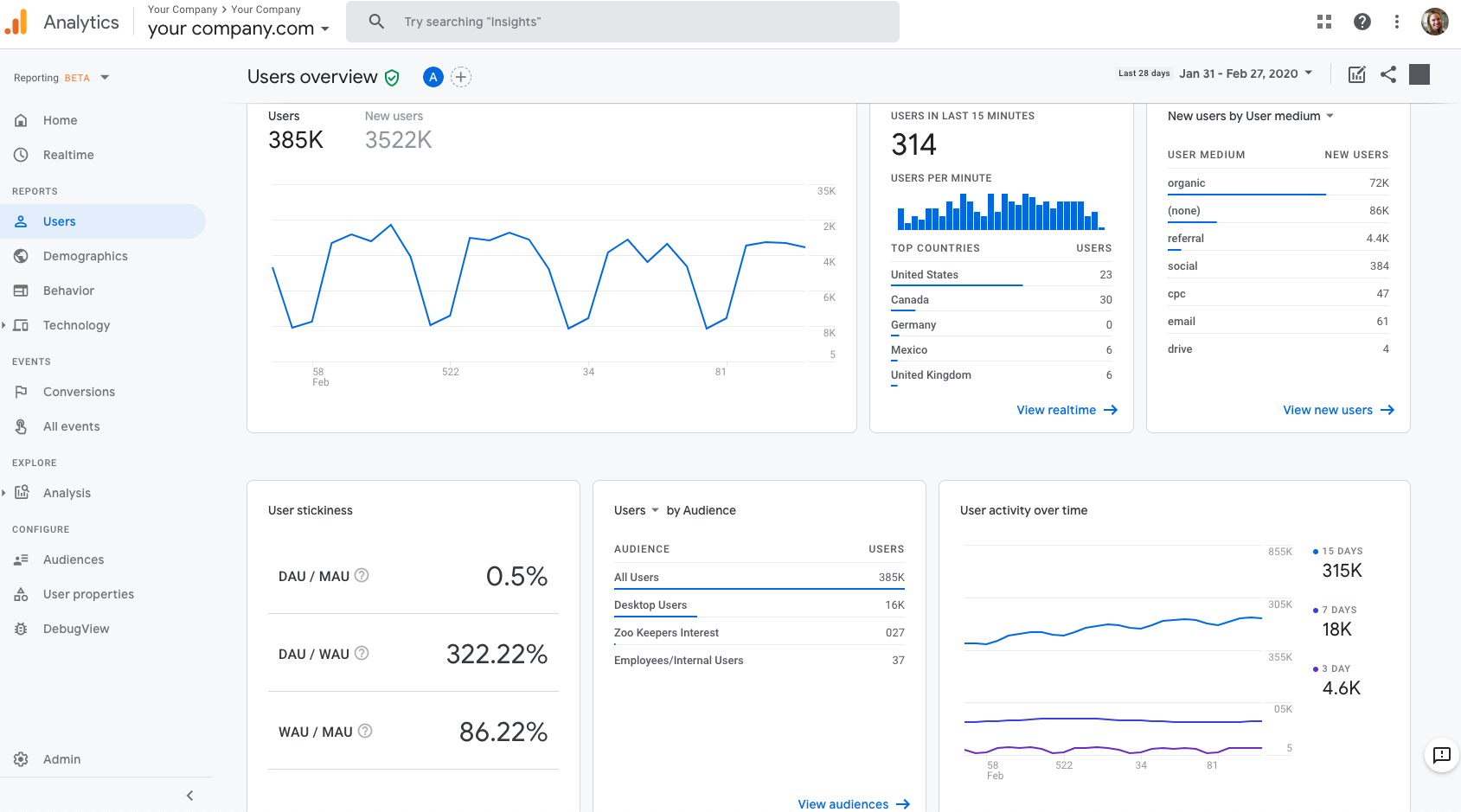
Google Analytics 4: Complete Buyer's Guide
Google's strategic evolution in AI-driven behavioral analytics
Google Analytics 4 represents Google's strategic evolution in AI-driven behavioral analytics, positioning itself as the comprehensive solution for marketing professionals navigating the cookie-less future while maintaining deep integration within Google's advertising ecosystem.
Market Position & Maturity
Market Standing
Google Analytics 4 occupies a dominant position in the web analytics market with 36% market share in North America[41][47], reflecting both Google's established market presence and the platform's evolution from Universal Analytics.
Company Maturity
The platform's enterprise maturity is demonstrated through comprehensive implementations across diverse industries, including automotive (Toyota Astra Motor), financial services (Millennium bcp), and hospitality (Jardine Restaurant Group)[53][55][57].
Growth Trajectory
Google's strategic investment in GA4 reflects broader market trends toward AI-driven analytics and cookie-less attribution. The platform serves as a cornerstone of Google's advertising ecosystem, ensuring continued development and feature enhancement aligned with evolving privacy regulations and marketing technology requirements[50][55][57].
Industry Recognition
Industry recognition includes widespread adoption across Fortune 500 companies and integration partnerships with major marketing technology vendors.
Strategic Partnerships
The platform's BigQuery integration provides enterprise-grade data warehousing capabilities, positioning GA4 as suitable for organizations requiring advanced analytical infrastructure[55][59].
Longevity Assessment
Long-term viability benefits from Google's commitment to the platform as Universal Analytics phases out, creating migration momentum that strengthens GA4's market position.
Proof of Capabilities
Customer Evidence
Jardine Restaurant Group achieved over 200% increase in return on ad spend after implementing GA4 with BigQuery and Recommendations AI integration, enabling precise audience segmentation and real-time campaign adjustments[57].
Quantified Outcomes
Millennium bcp reported 2.6x higher conversion rates for owned media campaigns using GA4-generated audiences, alongside a 36% reduction in cost per acquisition (CPA) for paid media[53].
Case Study Analysis
Toyota Astra Motor leveraged GA4's BigQuery integration to track comprehensive user behavior and campaign performance, resulting in enhanced audience targeting capabilities via Display & Video 360[55].
Market Validation
Market validation is evidenced by GA4's 36% market share in North America[41][47], reflecting widespread enterprise adoption and market confidence in Google's analytics platform.
Competitive Wins
Competitive wins include documented cases where organizations selected GA4 over specialized platforms like Mixpanel and Amplitude, primarily due to integration advantages and predictive capabilities without custom development requirements[41][45][51].
Reference Customers
Reference customers span multiple industries including e-commerce (Domino's), automotive (Toyota), finance (Millennium bcp), and hospitality (Jardine Restaurant Group)[53][55][57][59].
AI Technology
Google Analytics 4's technical foundation represents a fundamental architectural shift from Universal Analytics, built on an event-driven data model powered by machine learning algorithms that enable predictive behavioral analysis.
Architecture
GA4's architecture centers on cross-platform event tracking that natively captures user interactions across multiple touchpoints without third-party tools.
Primary Competitors
Google Analytics 4 competes primarily against specialized behavioral analytics platforms including Mixpanel and Amplitude[50][51].
Competitive Advantages
Primary competitive advantages center on cross-platform tracking that natively captures user interactions across web, iOS, and Android platforms without third-party tools, whereas Mixpanel requires custom coding for multi-platform analysis[50][56].
Market Positioning
Market positioning places GA4 as the comprehensive marketing analytics solution within Google's ecosystem, contrasting with specialized platforms that focus on specific analytical domains.
Win/Loss Scenarios
Win scenarios favor GA4 when organizations require Google Ads integration, cross-platform attribution, and predictive analytics without custom development. Loss scenarios occur when organizations prioritize detailed user journey analysis, unlimited funnel customization, or vendor-neutral solutions[50][51].
Key Features

Pros & Cons
Use Cases
Integrations
Pricing
Featured In Articles
Comprehensive analysis of AI Behavioral Analytics for AI Marketing & Advertising for AI Marketing & Advertising professionals. Expert evaluation of features, pricing, and implementation.
How We Researched This Guide
About This Guide: This comprehensive analysis is based on extensive competitive intelligence and real-world implementation data from leading AI vendors. StayModern updates this guide quarterly to reflect market developments and vendor performance changes.
60+ verified sources per analysis including official documentation, customer reviews, analyst reports, and industry publications.
- • Vendor documentation & whitepapers
- • Customer testimonials & case studies
- • Third-party analyst assessments
- • Industry benchmarking reports
Standardized assessment framework across 8 key dimensions for objective comparison.
- • Technology capabilities & architecture
- • Market position & customer evidence
- • Implementation experience & support
- • Pricing value & competitive position
Research is refreshed every 90 days to capture market changes and new vendor capabilities.
- • New product releases & features
- • Market positioning changes
- • Customer feedback integration
- • Competitive landscape shifts
Every claim is source-linked with direct citations to original materials for verification.
- • Clickable citation links
- • Original source attribution
- • Date stamps for currency
- • Quality score validation
Analysis follows systematic research protocols with consistent evaluation frameworks.
- • Standardized assessment criteria
- • Multi-source verification process
- • Consistent evaluation methodology
- • Quality assurance protocols
Buyer-focused analysis with transparent methodology and factual accuracy commitment.
- • Objective comparative analysis
- • Transparent research methodology
- • Factual accuracy commitment
- • Continuous quality improvement
Quality Commitment: If you find any inaccuracies in our analysis on this page, please contact us at research@staymodern.ai. We're committed to maintaining the highest standards of research integrity and will investigate and correct any issues promptly.